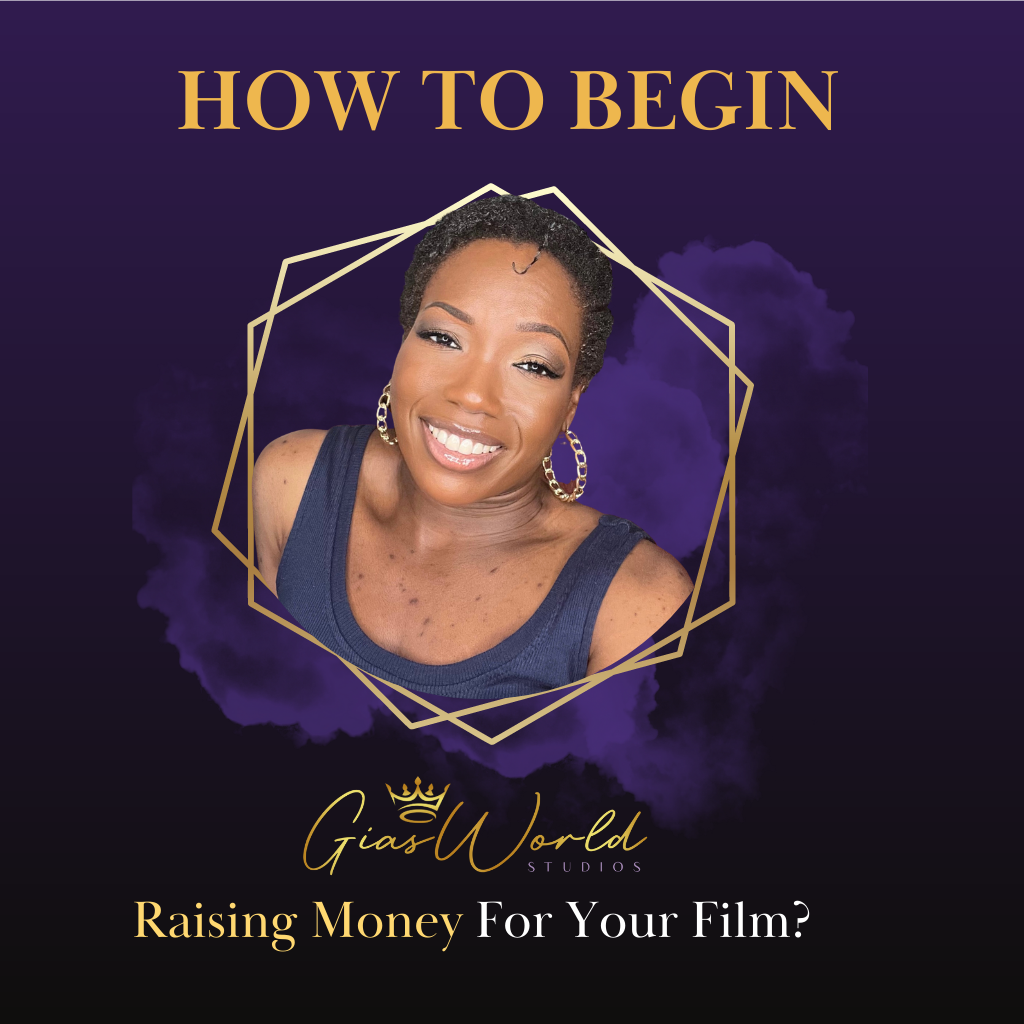How To Begin Raising Money For Your Film?


How are you going to raise the money? What are you doing now to raise money?
Two of the most asked questions to any new independent filmmaker. I can’t tell you how many horror stories I’ve heard about unfinished projects due to lack of money right at the finish line. That thought + the nervousness made me want to vomit many times.
But I made a promise to myself that my project would get completed from beginning to end. The only way to ensure this was to:
- Keep my full-time job!
- Budget a portion of each paycheck to my film
- Take things incredibly slow
- Focus on completing one task at a time
- Get as much experience on film sets and make connections
- PLAN like my life depended on it
- Don’t compare myself to others! (No matter what)
So, script? (Check). Treatment? (Check). Synopsis? (Check). Mood Board? (Check). Movie Poster? (Check! But tentative). Rights? (Check). Budget Plan? (Check). Production Team? (Almost there).
Now, it’s time to semi-focus on generating capital. I began by asking myself, “what’s probably going to be the easiest way to raise money for any small film production?” My immediate thought was “grants”. So, I searched for film grants on google and was immediately led to the film site, FilmDaily.tv.
It listed dozens of grants, their deadlines, and what was required to apply. But I was disappointed when I saw that over 95% of the grants were for “documentaries”. My film was a short, narrative drama and I was getting more upset with each click.
How do you get funding for an independent film?
If you’re making your first film, start in-house with your family and friends. But don’t just approach them with your excitement. Show them you’re serious. Create a film proposal. Show them a written plan for your film because remember, you don’t have a track record yet.
Also, start small. Don’t approach people with a huge budget especially if you intend on filming it yourself. Build slowly and allow the world to catch up later!
Lastly, realize people with plenty of funds at their disposal don’t have money to waste. However, they can accept mini financial losses as long as the person really tried their best, corrected their mistakes and kept moving forward.
If you don’t have family or friends to turn to, join a film community or find an organization that offers fiscal sponsorship (where donors get a tax-deduction for their donations) for filmmakers.
So, I took a step back, recentered myself, and kept on looking. After 3 hours or so of researching I managed to generate a spreadsheet of 7 grants: The Green Room Filmmaker Fund, Filmmakers Without Boarders, the Ford Foundation (Just Films), Cine Reach Grants, the Roy W. Dean Grant, the Carolyn First Decade Fund, and the WIFV Fiscal Sponsorship.
I immediately went for the WIFV Fiscal Sponsorship since I’m already a member of their community. Then, I called the WIFV offices for more information and Melissa informed me that details for the sponsorship will be coming out in a few weeks.
So, I’m back to waiting again. I decided in the meantime to just continue working on getting more documents and film experience in place.
Luckily, in between that time, I managed to get hired as an “extra” on a film called, “The Laptop” by director Mike Kravinsky. This experience led me to another role referred to me by Mark Ricche, as a supporting actress on the short horror film Douen by Forbes 1000 list director Alyscia Cunningham. Lastly, I landed a Key Production Assistant gig with film director Adielenah Perez to cover the Women’s March in DC.
How do I ask for film funding?
There are a few ways you can ask for funding:
1) Grants and/or film-funding competitions – Do some research and see what is on average required for submission. Usually, most ask for some sort of screener or trailer of your intended film. So, if you can get a few scenes on camera, you’re in a great spot.
2) Crowdfunding Campaigns – this tool is only good if you have either a solid fan base, social media following and/or large email list that you’ve been grooming for financial support. Examples include Kickstarter, GoFundMe, IndieGogo, and Seed&Spark. The successful campaigns I’ve seen had great visuals, a mini trailer, gifts/perks and the directors already had experience directing multiple award-winning films.
Also, as a first-time filmmaker, keep the amount of money you intend to raise to a small/medium amount and make sure you’re personally saving money for your film as well. Form an LLC for your company and have a separate checking account for it.
Show that you’re not some potential one-hit wonder.
3) Podcasts – this option may be a bit tricky, but I would join really active film communities and film Facebook groups. I’ve seen many posts with new podcasters asking for guest speakers.
(Note: Try to make sure the audience of the podcaster resembles your target audience).
Make sure before you accept the speaking engagement you have a nice website for your film (it can be a 1-pager) with a donate button.
4) Press / Social Media – Try to be everywhere. I have a blog, LinkedIn, TikTok, and YouTube page where I’ve been documenting my film journey both verbally and in the written form. I also intend to get on X very shortly as well. By being socially active you’ll be establishing yourself as a thought leader.
If you have the guts, you can take it a step further by writing press articles, booking yourself for speaking engagements, and on your local radio, television/news stations.
Then, the WIFV Fiscal Sponsorship announcement comes out. I pounce on it right away. It requires an application cover letter, the film resumes of the applicant and the production team, a distribution plan, shooting schedule, budget top sheet, target audience, synopsis, a list of donors and 3 letters of recommendation. (Hmmm).
It was 10:30pm on the night the fiscal sponsorship application was due when I finished submitting all my documents to Melissa. Then I read that a $50 application fee was supposed to be sent with my application. But, where’s the link? OMG, there’s no link!
I started freaking out. My heart was pumping. To improvise, I sent the fee via PayPal. I wake up the next morning to an email from Melissa saying they don’t use PayPal, I should instead send the fee via Zelle, and that I shouldn’t worry that my application will still be considered on time. (Whew!)
How to get sponsors for a film?
This was particularly hard for me to do since again I had no track record. But what one of mentors told me was to find something in my short film that stands for a good cause. For example, in my film the main character has an eye problem.
From there my mentor told me to reach out to the media departments of organizations that deal with optometry. She also told me to provide ways on how associating with my film can give back to the community and bring more patients and awareness to their organization. Examples can include offering free eye exam kits.
Now, although it didn’t work out in the end, I will say that each time I called an organization asking if they’d be open to sponsoring my film, they would be so intrigued about my film’s backstory that they were eager to read my film proposal.
The reality is no one really reaches out to organizations asking for a film sponsorship as much as you’d think. So, even though they may say ‘no’ now they could potentially say ‘yes’ in the future for your next film.
I think what also increased my rejection rate was the fact that I didn’t have a solid social media following and website in place. (I was running on pure adrenaline and enthusiasm).
Here’s a video on film sponsorship that can really help you.
Lastly, I had another itch to have a backup plan. Since the turnaround time for the WIFV fiscal sponsorship was 9 weeks, I decided to look for another fiscal sponsorship to apply for. I landed on Carole Dean’s film website “From The Heart Productions”. Their turnaround time was 3-10 business days for an $80 fee. So, I applied. I only needed to provide a summary of my film, the length of it in minutes, and the social media pages.
Shockingly, within less than 24 hours, my application got approved. Less than a month later I received my first financial donation for an Executive Producer credit on my film. (The rush is unreal!).
Until next time!
Who puts the money up for a movie?
The Executive Producer.

Push the play button below to see some fun BTS footage during my time on the film “Douen“!
Other posts you may be interested in:
- Why A Film Treatment Is Important?
- How To Navigate Between A Film Copyright & Trademark?
- How To Find The Right Film Director?
Disclaimer:
The author is not liable for any losses or damages related to actions of failure to act related to the content in this article. If you need specific legal advice, consult with an attorney who specializes in your subject matter and jurisdiction.


How To Plan For Pitch Video Success? (+ BTS Footage) - Gia's Crazy Life | 14th Nov 21
[…] How To Raise Money For A Short Film? […]
Gant (IT) | 4th Jan 22
Great content! Keep up the good work!
giaforetia | 21st Oct 22
Thank you so much.
What Happens As A Producer During A Film Production? - Gia's Crazy Life | 23rd Aug 22
[…] How To Begin Raising Money For Your Film? […]
How To Get Through Your First Table Read? - Gia's Crazy Life | 23rd Aug 22
[…] How To Begin Raising Money For Your Film? […]
cialis canadian pharmacy | 26th Aug 22
trust pharmacy canada https://canadianpharmaceuticalsonline.home.blog/
You actually revealed it superbly.
giaforetia | 21st Oct 22
Thank you so much! I’m glad I can help.
Why A Film Treatment Is Important? - Gia's Crazy Life | 26th Mar 23
[…] How To Begin Raising Money For Your Film? […]